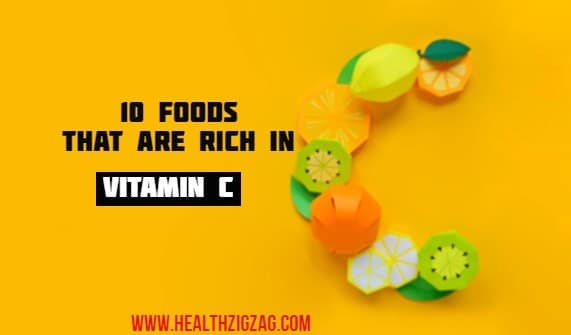
Contents [show]
10 Foods That Are Rich In Vitamin C
Known for its energizing power, vitamin C has many other interests for the body. What are they? What are the foods rich in vitamin C?
Vitamin C brings many benefits to our body. True antioxidant fighting free radicals, it promotes the regeneration of vitamin E . This allows the body to fight more against cellular aging. Vitamin C is involved in the synthesis of collagen, a protein that supports the tissues, the tone of the skin, but with age, our body produces less and less, which is why it loses its firmness.
Vitamin C also plays a role in the proper functioning of neurotransmitters and ensures good cognitive activity. It facilitates the absorption of iron and thus increases the rate of red blood cells. Its consumption, therefore, limits the risks of anemia and fatigue [1].
It is also useful for detoxifying the liver. Vitamin C is water-soluble, so our body can not store it, so you have to bring it every day and be sure to eat raw foods if you want to take full advantage of this vitamin because it is sensitive to heat [2].
Want to boost your vitamin C intake? Here is the list of 10 foods that are rich in vitamin C!
The raw yellow pepper (184 mg / 100g)
Pepper is a very good source of vitamin C. It is yellow pepper that contains the most, followed by red (159 mg / 100g) and green (92.2 mg / 100g). If it can be eaten both raw and cooked. It is the preserving of all heat that will offer the most vitamin C. Enjoy the summer to incorporate it into your salads. You can count yellow pepper on the top of the list of foods that are rich in vitamin C.
Blackcurrant (181 mg / 100g)
This fruit is very rich in antioxidants, especially in polyphenols, which makes it possible to better fight cell aging. Like all red fruits, blackcurrant has known to improve eyesight and limit visual fatigue and blood circulation. You can eat it in various ways: fruit salad, pie.
Fresh parsley (177 mg / 100 g)
In addition to having a good level of vitamin C. Parsley is rich in potassium, fiber, iron, vitamin B9, which is ideal for pregnant women . Vitamin B9, also known as folic acid, is indeed recommended to reduce the risk of malformations of the neural tube (the future central nervous system) in the fetus [3]. Whether you have a garden or not, you can easily grow it at home. Keep an example, your mini garden of herbs in your kitchen, handy, to decorate your dishes or your dressings will!
Raw Brussels sprouts (103 mg / 100g)
Like all cruciferous plants, it is a well-known food for protecting cells against cancer and is also recommended for the detoxification of the liver.
Despite its many virtues, its bitter taste when cooked can sometimes repel some palates. The specialist then proposes to eat it raw, sliced with a small vinaigrette, to benefit from its vitamin C while avoiding its pronounced taste.
Kiwi fruit (92.7 mg / 100g)
This is a fruit rich in vitamin C, potassium and containing a little fiber to promote intestinal transit. Also, the expert states that the kiwi has a low glycemic index and is low in calories [4]. Do not hesitate to put in your fruit salads to give them color and vitamins!
Strawberry (67.4 mg / 100g)
On the return of the beautiful days, the strawberry invades the vegetable gardens and market stalls. No reason to miss it because it has a good rate of vitamin C. It is also low in calories, easy to digest, low in sugars and rich in water to quench your thirst. Crue, on pies or in the salad, you will be able to benefit from it while taking care, ideally, not to sweeten it.
Orange (57mg / 100g)
Renowned for its vitamin C content, orange is a safe bet. Again, it is better to eat raw with its pulp. A lot of people think well by drinking their glass of orange juice in the morning, but the glycemic index is then higher, and then, by eating the fresh fruit, you will also benefit from its fibers.
Homemade lemon juice (42.4 mg / 100g)
Citrus fruits are known to be rich in vitamin C. Lemon is no exception to the rule. To benefit from its virtues, some people drink the juice of half a lemon when waking up. The acidity starts the digestive system and destroys bacteria. This is very effective in breaking down food and is therefore ideal for people whose stomachs are not sufficiently acidic. However, the consumption of lemon not recommended in cases of stomach ulcers.
Grapefruit (40.9 mg / 100g)
Often eaten as a starter, grapefruit is a delight for our tables. Be careful not to sweeten too much. We recommend instead to opt for a juicy and naturally sweet variety such as red flesh pomelo. In addition to its vitamin C intake, grapefruit contains beta-carotene to preserve the skin’s beauty. It turns out, moreover, very little caloric!
Chives (39.7 mg / 100g)
This is an aromatic herb with many virtues. Chives have vitamin C, fiber and are rich in beta-carotene. Moreover, it is part of the family of Alliaceae just like onion or garlic. So it is effective in supporting the immune system and fight against certain bacteria.
The Bottom Line:
Vitamin C rich foods are high in antioxidants which are good for your heart health and reduce the risk of heart diseases.
Read Also: What do you need to know about vitamin A
Read Also: 10 Most Protein-Rich Vegetables




